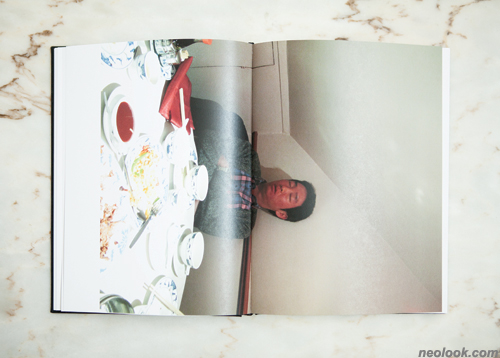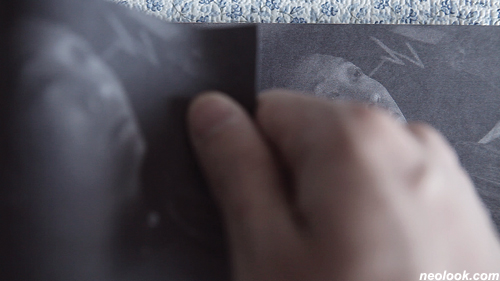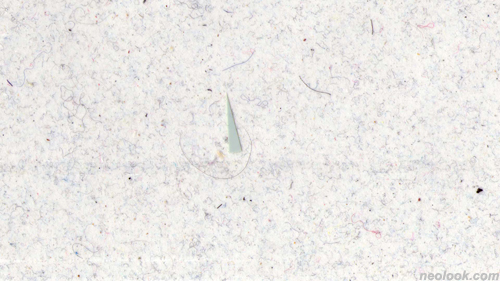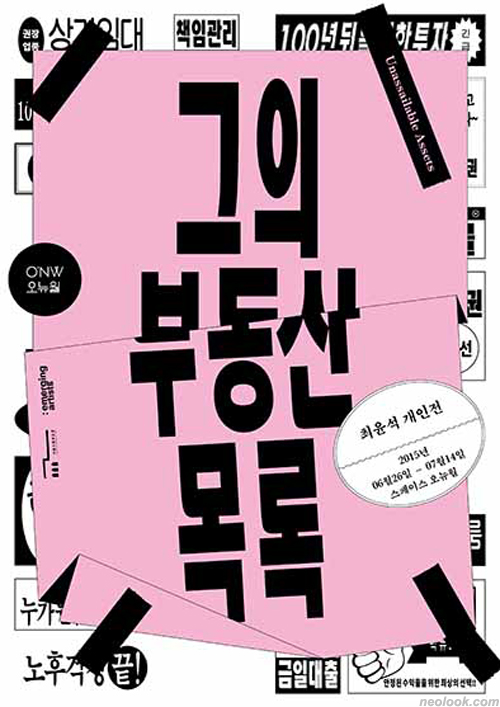- ● homepage
- ● archives
- ● restoration
- ● books
- ● big banners
- ● post board
- ■ neo's search
- ■ about us
- ■ 게재방법 안내
- 개인정보처리방침

- [email protected]
- Tel. 02_335_7922
- Fax. 02_335_7929
- 10:00am~04:30pm
- 월요일~금요일
- 3/3(월) 대체공휴일

그의 부동산 목록_Unassailable Assets
최윤석展 / CHOIYOONSUK / 崔倫碩 / video.installation 2015_0626 ▶ 2015_0714 / 일,공휴일 휴관

- 최윤석_Thank you, mum!_티셔츠_71.5×63cm_2014
초대일시 / 2015_0626_금요일_06:00pm
주최 / 스페이스 오뉴월 후원 / 서울시립미술관
관람시간 / 11:00am~06:00pm / 일,공휴일 휴관
스페이스 오뉴월 Space O'NewWall 서울 성북구 선잠로 12-6(성북동 52번지) Tel. 070.4401.6741 www.onewwall.com
어느 수집가의 위대한 일상 ● 최윤석은 탁월한 수집가다. 지금 그는 여기 모인 우리에게 자신의 수집품 목록을 공개하고 있다. 대부분 이렇다 할 계획 없이 수집된 하찮은 물건들과 기억, 행동, 소리, 습관 등 비물질적인 것에 대한 시시콜콜한 기록들이 하나의 소유재산이 되기까지의 일련의 과정을 겪은 후, 마침내 자신이 소유하게 된 수집품 목록의 실체를 공개했다. 그가 "부동산"이라 부르는 그것들은 타인들로부터 그에게 양도된 일체의 수집품과 기록물의 형태들을 일컫는다. 우연히 마주친 일상의 물건들이 하나의 수집품에서 자신의 특별한 재산 목록이 되기까지, 한 사람이 어떤 대상과 지속시켜 나가는 관계는 매우 특별하다. 오래 전, 발터 벤야민(Walter Benjamin)은 「수집에 관한 한 강연」에서 자신의 서재를 회중에게 펼쳐 보였다. 그가 공개한 것은 잘 분류된 상세한 도서목록도 아니었고 책 내용에 관한 지식 차원의 해설은 더더욱 아니었다. 벤야민은 자신이 오랜 시간에 걸쳐 서재에 모아둔 책 더미들에 대해 갖게 되는 조금 더 사적인 관계, 즉 자신의 수집 행위가 지닌 어떤 특별한 의미를 말하려 했던 것이다. 그래서 지금 우리는, 작가 최윤석이 펼쳐 놓은 그의 수집품 목록을 들여다보며, 언젠가 그가 저 하찮은 물건들과 마주쳤을 때의 우연한 상황에 잠시 머무를 준비를 해야 한다.

- 최윤석_Sleep Book_수제본 출판물_27.9×21×3.9cm_2004~15

- 최윤석_Sleep Book_수제본 출판물_27.9×21×3.9cm_2004~15_부분
최윤석의 개인전 제목은 「그의 부동산 목록」이다. 박태원의 단편소설 『딱한 사람들』(1934)에서 소제목으로 쓰였던 문구를 그는 자신의 전시 제목으로 가져다 썼다. 소설 속에서, 가난하고 무력한 시대를 살고 있던 두 청년은 자신들의 생존을 위해 소유하고 있는 물건들 중에 돈이 될 만한 것들을 찾아보기로 한다. 현실에서는 아무런 쓸모없이 빛바랜 물건에 지나지 않는 것을 찬찬히 들춰보면서 마치 변명이라도 하듯 내다 팔 수 없는 나름의 특별한 이유를 언급한다. 이때 그의 부동산 목록은 무슨 의미일까. 단지 "그"에게만 유효하고 의미 있으면 그만이지만, 배를 곯는 그들에게조차 그것은 전혀 미동도 않는 비현실적인 과거의 유품에 불과해 보인다. 그러나 끝내 그들은 쓸모없는 찌꺼기처럼 현실에 남아있는 과거의 물건들에 다시 자물쇠를 채운다. 수집가에게 "기억되고 생각되어지며 의식되어지는 모든 것"은 소유재산의 "초석"이자 "자물쇠"가 되는 것이라 했던 벤야민의 말 그대로다. 소설 속 인물들과 마찬가지로, 최윤석은 일상의 잔여물처럼 자신에게 남겨진 별 볼 일 없는 것들에 대한 기억과 의식의 경험으로 "그의 부동산 목록"을 써 내려갔다. 직접 부른 노래의 녹음 파일, 1년 치 영수증, 휴대전화에 저장된 사진, 침대 위의 체모와 먼지, 두루마리 휴지 등 차마 내다버리지 못하고 모아둔 일상의 흔적들이 전부였다. 그는 왜 이다지도 쓸모없고 하찮은 것들에 연연해 일상의 한켠에 쌓아두는 것일까. 그의 수집품들은 하나같이 감탄할 만큼 특별할 것이 없는데도 말이다. 하지만 벤야민이 "수집가는 소유에 대해 수수께끼 같은 관계를 갖는다"고 말한 것과 박태원의 소설 속 딱한 사람들이 주고받은 대화로 봐서, 일상의 사소한 것들을 애써 수집하는 최윤석의 취미는 오직 그와 그 대상 간의 수수께끼 같은 관계에 의존한다.

- 최윤석_올해의 질량 2012_한 해 동안 수집한 영수증_가변크기_2012~13
그렇다면 이제 그가 공개한 "그의 부동산 목록"을 보기로 하자. 수집된 소리로 만들어진 「조율: 만남」(2015)은, 소위 국민가요로 불리며 한때 남녀노소를 막론하고 애창했던 「만남」에 관한 그의 개인적인 경험과 기억에서 시작됐다. 어느 날, 최윤석은 그의 할머니와 통화하던 중 예고 없이 수화기에 대고 노사연의 「만남」을 불러주신 할머니의 낯선 노랫소리를 기억하고 있다. 온 국민이 애창했던 통속적인 연가(戀歌)가 일상의 어느 날부터 그에게는 돌아가신 할머니를 기억할 수 있는 하나의 유품처럼 남게 됐다. 이처럼 그는 일상에 대한 인상들을 수집하고 기록했다. 일상의 시간 속에서 그저 방치되었다가 언젠가 대수롭지 않게 사라져버릴지 모르는 것들을 뜻밖의 순간에 발견해내 자신의 수집품 목록에 넣었다. 예컨대, 그는 할머니가 불러주신 그 노래를 약 한 달 간 아침마다 베개 머리맡에서 반복해 부르곤 했는데, 습관처럼 불렀던 노래를 그냥 흘려 보내지 않고 일일이 녹음하여 모아둔 것이 어느 날 보니 제법 됐다. 최윤석은 각각의 노랫소리를 쌓아올리듯 한데 모아 1분 50초 분량의 곡 하나로 완성시켰다. 이제 그것은 라디오에서 흘러나오는 뻔한 유행가가 아니라 그의 일상에서 완벽하게 조율된 새로운 무엇임을 환기시킨다. 또한 1층 전시장을 소리로 가득 채운 「조율: Time After Time」(2015)도 마찬가지다. 교회의 오르간 연주를 연상시킬 만큼 성스럽고 엄숙한 음악의 정체는 1980년대에 신디 로퍼(Cindi Lauper)가 불렀던 팝송 「Time After Time」이다. 제목에서 출처를 밝혔음에도 불구하고 작가가 말해주지 않으면 영 몰랐을 것이다. 그는 원곡을 15배 정도의 시간으로 늘려 곡 전체의 질서를 자신의 방식대로 조금씩 바꿔 놓았다. 마치 겹쳐진 물감 층으로 뿌옇게 흐려진 리히터의 그림처럼, 쉽게 알아들을 수 없을 만큼 조금씩 어긋나게 겹쳐진 그의 노랫소리들은 일상의 모습을 매우 낯선 형식으로 바꾸어 놓았다. ● 그런가 하면, 최윤석은 무덤덤해 보이는 일상만큼이나 사소한 것, 게다가 현실에서는 쓸모조차 없는 것들을 수집하는 자신의 직관과 선택에 대한 정당한 명분을 밝힌다. 「올해의 질량 2012」(2012~2013)는 한 해 동안 모아둔 영수증을 재료로 한 것인데, 그는 그것으로 실을 만들어 실타래를 엮었다. 1년 치 영수증의 기록들은 그가 무엇을 먹었고, 무엇을 샀고, 어디에 갔었는지를 밝혀주는 일상의 단서다. 하지만 그 소비와 지출 내역도 그의 기억과 중첩되었을 때만 사적인 기록으로서의 의미를 얻게 된다. 버리지 못하고 무작정 모아두었던 영수증 종이가 한 뭉치의 실타래로 만들어져 작가의 수집품 목록에 오르기까지, 그는 이 케케묵은 일상의 파편들을 들추면서 지극한 일상으로부터 조금 떨어져 있는 자기만의 방에 옮겨 두는 것이다. 그가 일상을 기억하고 수집하는 방식이 그렇다. 그는 실타래처럼 뒤엉킨 그의 지나간 시간들을 딱 저만큼의 현존하는 크기와 질량으로 환원시켜 놓았다. 그에게 있어서 평범한 일상의 범주를 새롭게 접근하여 파악하려는 충동은 「휴지거리」(2012)에서도 잘 나타난다. 이 작업은 유학시절 하우스 메이트들과 겪었던 일상의 관계들을 두루마리 휴지로 시각화한 작업이다. 그의 경험에 의하면, 집을 공유해 쓰던 친구들은 휴지를 사용할 때 저마다 자기만의 방식을 보여준다. 혼자 따로 놓고 쓰든가, 돌아가면서 하나씩 내서 쓰든가, 순서와 방법은 다양하다. 그렇게 일상에서 발견된 개인의 규범과 습관들은 타인과의 관계 속에서 더욱 분명하게 드러나기 마련이고, 그때 나와 타인이 갖고 있는 일상의 습관은 딱 휴지 하나만큼의 거리를 두고 존재한다. "그의 부동산 목록"이 삶의 필요에 대해 이야기하던 가난한 두 청년 간의 거리를 끝내 좁혀주지 못했던 것처럼.

- 최윤석_I Was Born But_컬러, 단채널 영상_00:11:27_2015

- 최윤석_Bed Scene_컬러, 단채널 영상_00:02:08_2012~15

- 최윤석_Bed Scene_벽 설치_250×1020cm_2012~15
심지어 최윤석은 아무 일도 일어날 것 같지 않은 반복되는 일상에서 한 발 물러나 특유의 유머러스한 시선으로 일상 속의 자신을 관찰한다. 타인으로서의 자신을 들여다보며, 미처 자각하지 못하고 있던 자신의 별난 일상과 반복되는 습관을 발견한다. 예컨대, 말장난처럼 농담 섞인 제목의 「Bed Scene」(2012/2015)을 보면, 평소 그는 자신의 침대 시트 위에 붙어있던 체모, 각질, 먼지 등을 모아 전시장 한쪽 면을 가득 채운 벽지 형태로 공개했다. 또한 「모성을 위한 노래」(2014)는 매일 어머니께서 차려주신 밥을 먹으면서 익숙함에 길들여진 자신의 행동 패턴을 관찰하여 그것을 음악의 형태로 표현한 작업이다. 참고로 그가 보여준, 유년시절 어머니께 쓴 편지에서 자신의 잘못에 대한 반성을 두서없이 나열했던 것처럼, 그는 「모성을 위한 노래」에서도 자신의 몸에 밴 습관과 사소한 버릇 등을 악기 소리를 빌어 전부 보여줬다. 이처럼 최윤석은 일상의 하찮은 수집품과 행위의 기록을 통해 현실을 다시 바라본다. 그러한 태도는 적어도 평범한 일상에서 곧 사라질지도 모르는 쓸모없는 물건과 행위의 기록에 대한 최소한의 존중을 포함하고 있다. 이로써 작가는 일상 속에 가려진 개인의 존엄성에 대한 사유의 확장으로 이끌면서, 그것을 수집가로서의 자신의 일상 속에서 끊임없이 되살리곤 한다. ■ 안소연
The great trivia of a collector ● Yoonsuk Choi is a great collector. He is showing us a list of his collection here. He went through a series of process before every detailed record of trivial objects and unphysical objects, such as a memory, sound or habit, became his own possession. And he finally revealed the list of his possession. What he calls "assets" is forms of every collection and records handed over to him from others. Before an object one comes across in his daily life turns into his special possession from a mere collection, a relationship the person keeps with the object is very special. A long time ago, Walter Benjamin showed the audience his study in public in A Lecture on Collection. What he disclosed was not a detailed list of his well-categorized books or even an informational explanation on books. He was telling of more private relationship he started to have with a pile of his books, in other words some special meaning of his collecting habit. For now, therefore, we have to look into a list of his collection and be ready to remain in a situation where Choi came across the trivial objects. The title of Choi's exhibition is 「Unassailable Assets」. It came from one of the chapters in Korean novelist Taewon Park's short story Poor People. In the novel, two young men living in a poor and powerless society agree on looking for something they can sell from what they have for their survival. As they examines nothing more than useless and faded objects, they explains why they can't sell the objects as if to make an excuse. What is the meaning of Unassailable Assets here? It would be enough if it is effective and meaningful to them, but, even to the two hungry men, it seems nothing but an unrealistic relic of the past even without a slight movement. In the end, however, they lock up the objects of the past, still remaining in reality like useless waste, again. It is the same as what Walter Benjamin said: everything which is 'remembered, thought and recognized' is a 'foundation' and 'lock' of possession to collectors. Like the characters in the novel did, Choi wrote down his list of property based on his experiences of recognition and memories about insignificant objects left over to him like residues of everyday life. What he had was only a record file of his singing, a year of receipts, pictures saved on a mobile phone, body hair and dust on his bed and a roll of toilet paper. Why is he attached to these useless and unimportant objects and keep them in one side of his daily life even though there is nothing wonderful or special in them? Judging from Walter Benjamin's comment that says "Collectors have enigmatic relationship to possession" and a conversation of the poor people in Taewon Park's novel, in fact, Choi's hobby of collecting solely depends on enigmatic relationship between him and the objects. ● Now, then, let's take a look at 「Unassailable Assets」 he disclosed. 「Tuning: Rendezvous, (2015)」, sound installation, was created by his personal experience and memory of the famous song "Rendezvous" loved by many Koreans. He still remembers his grandmother who suddenly sang Korean singer Sayeon Noh's song over the phone one day. The popular love song sung by every Koreans has become a relic through which he can remember his last grandmother. Likewise, he collected and recorded impression of his daily life. He unexpectedly found out what could disappear even without being noticed after being neglected in everyday life and put it in his collection list. Every morning for about a month on his bed, for example, he used to sing the song his grandmother would sing to him. He recorded his singing of the song every time and he realized that now he had quite a great deal of the song recordings. He put the recordings together as if to pile up each singing voice and made them into a song running for 1 minute and 50 seconds). The song is not the same as the common popular song on the radio anymore. It is perfectly tuned and made new in his daily life now. The same goes with the sound installation 「Tuning: Time After Time (2015)」 filling the first floor of the exhibition hall with sound. The holy and solemn music reminding us of organ sound in a church is the song Time After Time sung by American singer Cindi Lauper in 1980s. It would have been hard to recognize the song even from the title of the installation if Choi didn't explain about it. He made the original song about fifteen times slower and changed the order of the song in his way. Like Gerhard Richter's paintings blurred with layers of paint, Choi's song which consists of overlapped melodies, making it hard to recognize the song easily, has changed everyday life into an unfamiliar form. ● Meanwhile, Choi clearly defines reasons for his intuition and choice of collecting trivial objects like daily life and useless things in a real life. He turned a year of receipts he collected into threads and knitted them to make 「Mass of the Year2012 (2012~2013)」. The receipts give us a clue as to what he ate, bought and where he went. However, his consumption and spending records become meaningful only when they overlap with his memories. He goes back and forth to his daily broken memories and takes them into his own room a little way off from the most common daily life until he recreates the pile of receipts into a ball of threads and put that on his list of collection. That is how he remembers and collects daily life. He changes his time of the past tangled up like a ball of threads into the real size and mass of time. His impulse to approach and understand daily life in a new way is well described in 「Toilet Paper Distance (2012)」. The installation made with a roll of toilet paper visualizes his daily relationship with his house mates he met when he studied abroad. He says his house mates showed different ways of using toilet paper. One may want to use it all by himself or several mates share it one by one. There are many orders and ways of using it. Individual's rules and habits found in daily life are more clearly revealed in relationship with others. The habits of mine and others are about the distance of a roll of toilet paper like the distance of two poor young men in the novel talking about the need of life fail to close after all. ● Beside, Choi takes a step away from a simple everyday routine and observes himself in his daily life in his unique humorous perspective. When one looks into himself from others' perspective, he comes to discover unusual routines and repetitive habits he hasn't recognized before. For 「Bed Scene (2012/2015)」, which has an interesting title, he collected body hair, dead skin cells and dust from his bed and stuck them on a wallpaper to fill one side of the exhibition hall. In 「A Song for Maternity (2014), he observed the pattern of his behaviors coming from getting used to having meals prepared by his mother every day and expressed that in a form of music. In the letter he wrote for the first time to his mother, he listed and regretted his wrongdoings without order. Likewise, he used the sounds of musical instruments to show all of his habits in 「A Song for Maternity」. He faces reality once again through unimportant collection and records of behaviors. At least, such an attitude includes the minimum respect for records of useless objects and behaviors which may soon disappear in ordinary life. Therefore, artists expand their thoughts on individual's dignity hidden behind daily routines and bring the expanded thoughts into their daily life as a collector. ■ Soyeon Ahn
Vol.20150626d | 최윤석展 / CHOIYOONSUK / 崔倫碩 / video.installation

